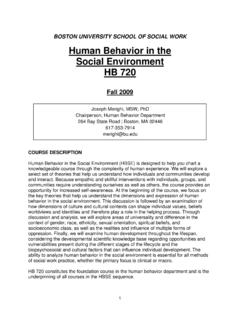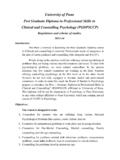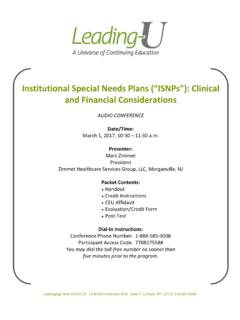Transcription of Academic Competencies for Medical Faculty - STFM
1 343 Vol. 39, No. 5 MDs and PhDs hired as new Medical school Faculty members face challenges, one of which is that they have received little training in significant areas related to Academic responsibilities. Physicians know how to treat otitis media, and PhDs have knowledge of their disciplines and research, but how does one become a good teacher? How does one function effectively in committees? How does one navigate the internal and external systems needed to achieve effective Medical education, research, and program development? In the past, it was assumed that intelligent people who have been students for many years have learned or can automatically learn to be successful Faculty members, and little or no support for Faculty development has been provided.
2 In recent years, increasing attention has been paid to teaching as a valid form of scholar-ship,1 and in many institutions the quality of a Faculty member s teaching is considered as individuals advance academically. New methods, including portfolio self-assessment, standardized peer review, and even post-tenure teaching evaluation, have been To facilitate high-quality teaching, more attention has been placed on Faculty development programs. System-atic enhancement of the role and importance of Faculty development has been supported by funding through the Department of Health and Human Services (DHHS) Title VII programs under the Public Health Service, Health Resources and Services Administration.
3 Some of these programs are provided through institutionally sponsored offices and offer on-site preparation for both internal and visiting Faculty by providing seminars on basic teaching, research skills, grant writing, Faculty development programs have focused on enhancing the abilities of Medical Faculty members to succeed and advance in academics. Programs vary in methodology but have been guided by the Academic responsibilities and needs of the particular Faculty . Faculty development programs also vary among schools because of the differing missions of the institutions, some focusing more on research, others on teaching.
4 Faculty development programs must also evolve to meet the changing needs of There is no recognized body of knowledge and skills required that Medical Academic Faculty must master. Academic Competencies for Medical FacultyDona L. Harris, PhD; Katherine C. Krause, MD; David C. Parish, MD, MPH; Mike U. Smith, PhDFrom the Department of family Medicine ( (Dr Harris) and the Department of Internal Medicine (Drs Parish and Smith), Mercer University; and the Department of family and Community Medicine, University of Pennsyl-vania [retired] (Dr Krause).Introduction: Physicians and basic scientists join Medical school faculties after years of education.)
5 These individuals are then required to function in roles for which they have had little preparation. While Competencies needed to perform in Medical school, residency, and practice are defined, there is little guidance for Faculty . Methods: An expert advisory group of the Faculty Futures Initiative developed a document delineating Competencies required for successful Medical Faculty . The propor-tion of time Faculty in various roles should allocate to activities related to each competency was also identified. Competencies and time allocations were developed for various teacher/administrators, teacher/educators, teacher/researchers, and teacher/clinicians.
6 This work was validated by multiple reviews by an external panel. Results: Trial implementation of the products has occurred in Faculty development programs at four Medical schools to guide in planning, career guidance, and evalu-ations of Faculty fellows. Discussion: The Competencies and time allocations presented here help Faculty and institutions define skills needed for particular Faculty roles, plan for Faculty evaluation, mentoring and advancement, and design Faculty development programs based on identified needs.(Fam Med 2007;39(5):343-50.) Faculty Development344 May 2007 family MedicineOne attempt to define the Medical academician is the influential work Successful Faculty in Academic Medi-cine5 by Bland and colleagues.
7 These authors generated and defined an extensive set of essential skills, goals, and objectives for successful Medical Faculty in five domains: education, administration, research, writ-ten communication, and professional Academic skills. More recently, Faculty roles in training students and residents have been expanded to require expertise in multiculturalism, care management, and information ,7 These definitions developed in parallel with the movement to define Competencies expected of Medical students, residents, and practicing ,8-12 Still, no comprehensive document exists outlining needed Competencies for primary purpose of this paper is to describe the process by which a list of Competencies for Academic Medical Faculty members was developed, to link these Competencies to Faculty roles that exist in most fam-ily medicine departments.
8 And to present that list for consideration by readers. Product DevelopmentDeveloping the Project TeamIn 1997, the Bureau of Health Professions funded the Faculty Futures Initiative (FFI), a program designed to develop a strategic plan for Faculty development in family medicine. An administrative/leadership project team and a 17-member advisory team guided the FFI. The latter included representatives from family medi-cine organizations (eg, Society of Teachers of family Medicine, American Academy of family Physicians, Association of Departments of family Medicine, and the Association of family Medicine Residency Direc-tors), private foundations (the Robert Wood Johnson Foundation), the primary care disciplines of pediatrics and internal medicine (American Psychological Asso-ciation, American Academy of Pediatrics, Society of General Internal Medicine), and primary care research (North American Primary Care Research Group).
9 Behavioral scientists, department chairs, program directors, and other widely recognized leaders in their respective disciplines with a commitment to and ex-pertise in Faculty development and Medical education were also recruited. During its deliberations, the 21 leadership and advi-sory committee members identified one central ques-tion: What do Faculty need to know? This question required that we first delineate the Competencies needed for success. A subcontract was awarded to two members of the FFI leadership project team who worked as part of the group of 21 to identify Faculty Competencies required for the different roles and functions of Faculty in Academic family medicine.
10 Development of the FFI Faculty Competency Assessment Checklists Based on a review of the literature,13,14 the members of the FFI generated a set of Competencies for Faculty ranging from clinical preceptors to Academic deans, who were then categorized as Faculty with teaching and non-teaching responsibilities. Subgroups developed the wording of each competency and categorized it as a component of leadership, administration, research, teaching, curriculum development, multiculturalism, Medical informatics, or care management. The FFI advisory group of 21 individuals (includ-ing physicians, educators, and program specialists) achieved consensus on a master list of Faculty compe-tencies, recognizing that any list of Academic competen-cies does not replace competence in discipline-specific knowledge and clinical skills.








